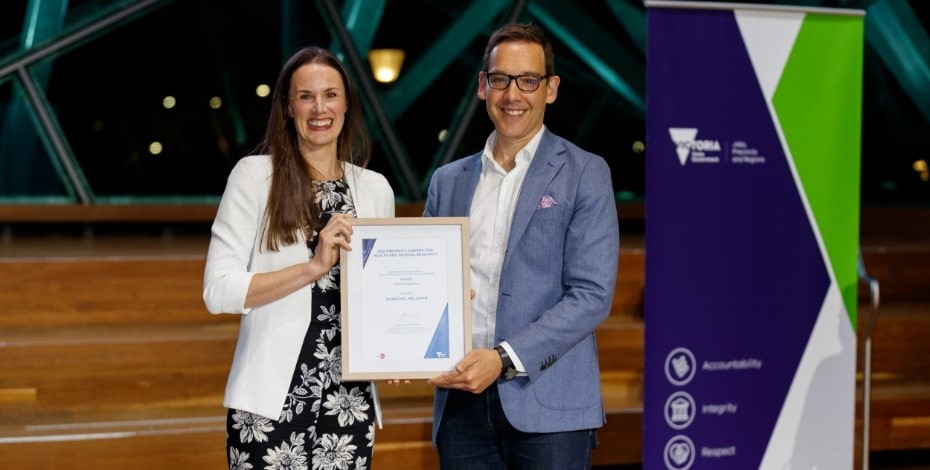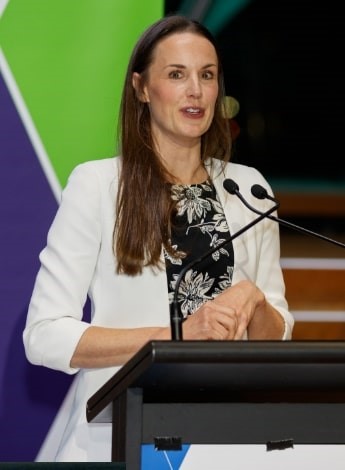
Premier’s Award for knee OA resources

Physiotherapist Rachel Nelligan has won a Premier’s Award for her work developing digital resources to help people with knee osteoarthritis, writes Marina Williams.
Dr Rachel Nelligan’s curiosity and drive to improve patient outcomes has led to her winning the Clinical Researcher category in this year’s Premier’s Awards for Health and Medical Research.
Rachel is a postdoctoral research fellow at the Centre for Health, Exercise and Sports Medicine at the University of Melbourne.
The acknowledgement is for developing and implementing effective and accessible self-management resources and programs for those living with osteoarthritis.
‘I feel very, very proud to have represented the physiotherapy profession at the awards.
'On a personal level, it’s incredible to be recognised for the work that I have done in the space of knee osteoarthritis and digital health,’ the APA member says.
‘I felt very proud to be the physiotherapist in the room as it is unique to be acknowledged in these awards.
'It’s also given me a real kick to continue my research in knee osteoarthritis and persistent pain conditions.’
The annual awards were established in 1995.
They are open to applications from PhD candidates within a health and medical field who are at least two years into their candidature at a Victorian academic or research institute and postdoctoral researchers within a health and medical field who have completed a PhD at a Victorian academic or research institute in the past three years.
As part of her PhD research, Rachel developed the My Knee Exercise website, which includes health information about knee osteoarthritis and provides a 24-week self-directed exercise regimen to ease pain.
Users can opt to receive additional support through automated exercise-behaviour-change messages sent via SMS.
The program has been designed for people aged 45 and above who are experiencing persistent knee pain or osteoarthritis.
It offers videos and stories of the experiences of others living with knee pain and exercise programs so that people have a reference for proper form.
It’s available free through the website and has more than 14,000 users from 93 countries.
Demand is strong in regions where osteoarthritis care is typically hard to access, says Rachel, and resources have been modified for use overseas, including in the UK, Japan and China.
Outcomes include a meaningful reduction in knee pain for more than 70 per cent of participants in a randomised controlled trial.
‘The programs help them do strengthening exercise and physical activity and also provide them with regular exercise support without a health professional needing to be involved,’ Rachel says.
‘Findings show that this kind of unsupervised intervention can meaningfully improve symptoms such as pain and function and improve quality of life for people with knee osteoarthritis.’
Knee osteoarthritis is one of the most common musculoskeletal conditions, reportedly affecting more than two million Australians and costing the economy $23 billion annually, according to an Access Economics report, Painful Realities: The economic impact of arthritis in Australia in 2007.
The condition imposes a substantial individual and societal burden, the researcher says.
‘It will become unsustainable for healthcare systems and the number of people affected has the potential to increase because challenges in accessing suitably trained health professionals can prevent them from participating in best-practice exercise treatment as well as adhering to regular exercise.
‘Evidence-based exercise programs can reduce osteoarthritic joint pain.
'This program is not only about exercise, but about educating people about exercise and knee pain before they start and giving them the tools to ensure they can succeed at a pace that suits them.

Physiotherapist Rachel Nelligan received the Premier's Award for creating online resources that help people with knee osteoarthritis exercise and self-manage their condition.
‘Qualitative interviews found that participants valued the program and felt that it kept them accountable to undertaking regular exercise and really made a difference to their quality of life and other outcomes.’
Rachel graduated from the University of South Australia with a Bachelor of Physiotherapy in 2005.
She has a Postgraduate Certificate in Clinical Physiotherapy (Women’s Health and Continence) and is a trained DMA Clinical Pilates instructor and dry needling practitioner.
Working as a clinician, predominantly in private practice, saw her focus on musculoskeletal and pelvic rehabilitation, developing a passion for working with patients experiencing persistent pain and women’s and men’s health concerns, including incontinence, vaginal prolapse and pelvic pain.
She embarked on a research career a decade ago.
‘Working in private practice, I became more curious about how we could help populations with persistent pain, which led me to do some more study in psychology.
'Then I became even more curious about how we could make outcomes for patients better, which led me to apply for a research assistant role at the University of Melbourne.
'During my work as a researcher, I gained a passion for how we could use digital health to help populations and I turned that work into a PhD.
'The rest is history,’ she says of her career trajectory.
The Australian Clinical Trials Alliance (the national peak body supporting and representing networks of clinician-researchers conducting investigator-initiated clinical trials) has also recognised Rachel’s curiosity and ability as a clinician-researcher, naming her as an emerging leader in its inaugural Emerging Leader Investigator Awards last year.
‘I see myself as a clinician and an academic.
'I want to help people better understand their condition and support and empower them to achieve their goals through accessible education and exercise programs.
‘Without a doubt having the experience as a clinician and working with people with persistent pain conditions has informed my research and given me a better understanding about how I develop interventions and communicate with them to get their feedback.’
An acceleration of increasing website visitors indicates there is a strong demand for digital resources to help people self-manage and gain more information about their condition, she says.
This demand inspires her curiosity ‘to find the best support options by exploring new, innovative approaches’.
‘Ultimately, as a physiotherapist, you’re inspired by helping people live better lives and be able to do the things that they enjoy.
'Part of my curiosity for research, when I was a clinician, was wanting to help people on a larger scale and digital health has helped me do that.
‘The ability to really improve access to quality interventions for people with persistent pain was very important to me.
'It also helps them have more informed conversations with their clinicians and I encourage clinicians to use the website as a useful or valuable resource that they can provide their patients to support their clinical care.’
Website resources will be updated to ensure they ‘stay current and meet people’s needs’ and industry feedback after the awards indicates that there is also an opportunity to develop content for other joints and conditions.
‘It is still early days, but I have had a lot of communication from others interested in my work as a result of the awards… conversations about how to collaborate and to apply the work that I’ve done in knee osteoarthritis to other conditions.
'I think this research is really applicable to a whole range of chronic conditions where exercise and education are key treatments.’
Main image: Dr Rachel Nelligan accepting the Premier's Award from Steve Dimopoulos, Parliamentary Secretary to the Premier.
© Copyright 2024 by Australian Physiotherapy Association. All rights reserved.





